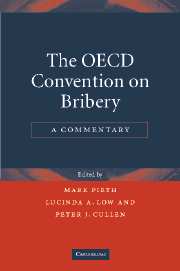Book contents
- Frontmatter
- Contents
- Notes on Contributors
- Preface
- Acknowledgements
- List of Abbreviations
- Official Documents
- PART I INTRODUCTION
- PART II COMMENTARY
- PART III THE CONVENTION IN PRACTICE
- Annex: Table of Applicable Sanctions in the Twenty-One Parties Reviewed in the Mid-Term Study
- Consolidated Bibliography
- Index
Preface
Published online by Cambridge University Press: 06 July 2010
- Frontmatter
- Contents
- Notes on Contributors
- Preface
- Acknowledgements
- List of Abbreviations
- Official Documents
- PART I INTRODUCTION
- PART II COMMENTARY
- PART III THE CONVENTION IN PRACTICE
- Annex: Table of Applicable Sanctions in the Twenty-One Parties Reviewed in the Mid-Term Study
- Consolidated Bibliography
- Index
Summary
In recent years there has finally been a global awakening to the need to fight corruption in order to promote development and preserve respect for public institutions.
I watched from side-stage when the problem of international corruption first broke in the mid-1970s. I was a practicing lawyer in Canada representing Lockheed Aircraft Corporation in what was then the largest military procurement in Canadian history. Suddenly Lockheed was caught up in scandals related to bribery of foreign public officials in several jurisdictions outside Canada. These scandals gave rise to the U.S. Foreign Corrupt Practices Act, a pioneering effort to curb international bribery and severely penalise the senior management of corporations who engaged in it. (As it turned out, Lockheed was the first to be exposed, but many more followed.)
I am proud that OECD and other countries joined this battle in 1997 with the negotiation of the Convention on Fighting Bribery of Foreign Public Officials in International Business Transactions. This binding treaty obliges signatories to take responsibility for corrupt practices of the companies operating from their territory – wherever in the world they may bribe.
What changed to enable the OECD to draft and conclude a convention against bribery in the late 1990s? The answer is globalisation. In the 1970s, countries still saw themselves as competing with each other, promoting the interests of their companies abroad. Globalisation changed the perception. It was clear that companies, not governments, were the competitors – and they needed a level playing field.
- Type
- Chapter
- Information
- The OECD Convention on BriberyA Commentary, pp. xi - xiiPublisher: Cambridge University PressPrint publication year: 2007

